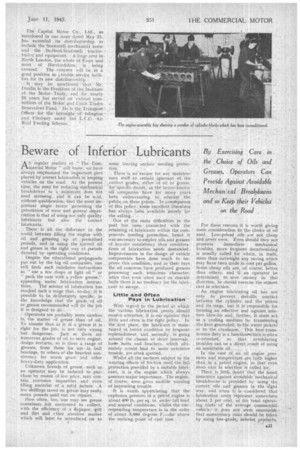Beware of Inferior Lubricants
Page 29

If you've noticed an error in this article please click here to report it so we can fix it.
By Exercising Care in the ,Choice of Oils and Greases, Operators Can Provide Against Avoidable Mechan!cal Breakdowns and so Keep their Vehicles on the Road
AS regular readers of " The Cornrcercial Motor " will know, we have always emphasized the important part played by correct lubrication in keeping vehicles on the road. At the present tirrie, the need for reducing mechanical breakdowns to a minimum does riot need stressing, and it can be
without qualification, that the most important single. factor governing the prevention of wear and general depreciation is that of using not only quality lubricants but also the correct ' lubricants.
• There is all the difference in the world between filling the engine with oil and greasing up at prescribed periods, and in using the correct oil and grease in the right way at periods dictated by operating conditions.
Despite the educational proPaganda put out by the big oil companies, one still finds such indefinite instructions as " use a few drops of light oil " or " pack the case with a yellow grease," appearing under lubrication instructions. The science of lubrication has reacbed such a stage that, to-day, it is possible to be deliberately specific, in the knowledge that the grade -of oil or,grease recommended will do the job
it is designed to do: •
• Operators are probably more careless in the matter of grease than of oil. To aisume that as it is a 'grease it is right for the job, is not only %wrong but dangerous. Just asthere are numerous grades of oil to meet enginedesign features, so is there a range of greases, from those for use in ball bearings, to others of the heaviest consistency for worm gears and other heavy-duty application.
Unknown brands of grease, such as an operator may be induced to puv chase by reason of low price, may contain corrosive impurities and even filling material of a solid nature. A few shillings saved on grease May easily mean pounds -paid but on repairs.
How often, too, one may see grease containers left, uncovered to collect, with the efficiency of a flypaper, grit and dirt and c ther abrasive matter which will later be introduced on to
some bearing surface needing protection.
There'is no excuse for any maintenance staff -to remain ignorant of the correct grades, either of oil or grease, for-specific dittieS," as the better-known
. oil companies have for many years been endeavouring to educate the
public on these r,oints. In consequence of this policy,, some excellent literature has, always been .available 'merely for • the asking. .
Ode ot the main difficulties in the past has been connected with the
retaining of lubricants within the cornponents needing motection, hence. it was necessaty to employ oils and greases of heavier consistency than considerations of lubrication needs demanded.
Improvements in the design of vehicle components have done much to improve this condition, and in their turn the oil concerns have .produced greases possessing such tenacious' characteristics that even when used on shackle bolts there is no tendency for the lubri. cant to escape.
Little and Often Pays in Ldbrication
With regard to the period at which the various lubrication .points should receive attention, it is our.opinion that little and often is-the right policy. In the -first place, the lubricant is main. tamed in better condition by frequent replenishment, and, secondly, in going around the chassis at short intervals, look bolts. and brackets, which ultimately would lead to more extensive trouble, are often spotted.
Whilst all the surfaces subject to the wearing effects of friction need the full protection provided by a snitable lubricant, it is the engine which always assumes major importance. The engine, of course, soon gives audible warning of impending trouble It is worth appreciating that the explosion pressure in a petrol engine is about 400 lb. per sq. in. under full load and normal conditions, whilSt the -corresponding temperature is in the order of .about 3,000 degrees F.—far above the melting point of cast iron. For these reasons it is worth giving sortie consideration to the choice -of oil u5ed.. tow-priced oils are not cheap and never were. Even should they not
promote • immediate mechanical troubles, more frequent decarbonizing is usually Called for which, in itself, mare than outweighs any saving which may have been made in cost per gallon. Some cheap oils are, of course, better than others, and if an operator be determined to save money in this direction, he should exercise the utmost care in selection.
An engine lubricating oil has not only to prevent Metallic contact between the cylinder and the piston and its rings; but it is' responsible for forming an effective seal against mixture blow-by and, further, it must act as a cooling, medium by transferring. the heat generated, to the water jackets or to the crankcase. This heat-transference duty is a functiondwhich is often overlooked, so that overheating troubles can be a direct. result of using an Unsuitable oil:. .
In the case Of an oil engine pressures and temperature.are both higher than in a petrol engine, so . that even more care in selection is called for.'
There.. is little, doubt that the finest insurance against avoidable 'mechanical breakdowns is provided by using the correct oils and' greases in the right .way, and when it is considered that lubrication costs represent somewhere about 2 per cent, of the total operating costs of the average . commercial vehicle,it does not seem -reasonable • that unnecessary risks should be taken . by using low-grade, inferior, products:




















































